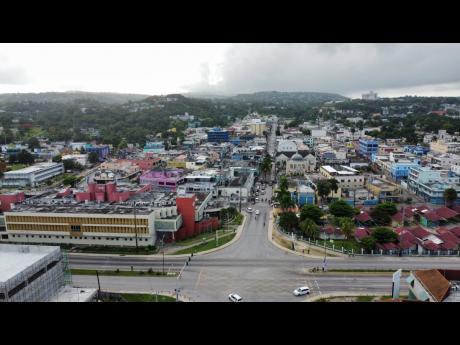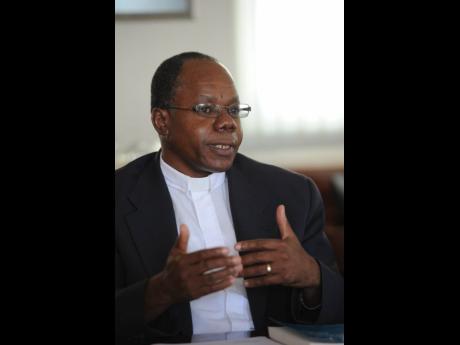Garth Minott | Commitment to development
In a visit to the Cayman Islands recently, I was struck by the vast development, especially in relation to infrastructure, in a country which, some years ago, was exporting its waste to Jamaica for disposal. With a population of close to 70,000 people - much less than that of some parishes in Jamaica - the pace of growth has been simply amazing. This shows that the past is not usually a means of determining the future. Hence, while I am sure Caymanians may be of the view that there is much more to their development, and the present is simply a step in the overall process and indeed not an end in itself, there is much to look forward to in the future.
Development, a process that creates growth, progress, positive change, or the addition of physical, economic, environmental, social, and demographic components, is not so much a fixed procedure nor should it be a value judgement. Rather, it ought to be understood as a dynamic process that is fluid and represents a more spiral than linear process. Though the Cayman Islands remains a colony of Britain, and as such, receives direct budgetary support from that government, it seems like there is a deliberate and conscious attempt by the local government to lift the standard of living of the people as part of an evolutionary process. There is no doubt that some people in the Cayman Islands may see the process differently. Nonetheless, just as a former prime minister of Jamaica used to accord ‘little Barbados’ with advanced development, when compared to Jamaica, in the same way, one’s perspective on development may differ from that of the others.
SUBJECTIVE
Perspectives or points of views on development are, of necessity, subjective. This allows for contending views. For example, what I view as development, which more relates to infrastructure rather than people, though I will address this matter later, will be viewed by some as backward and counter-intuitive. Similarly, as a visitor to the Cayman Islands for only the second time, the lens through which I viewed growth in the nation’s life may be seen by others as limited. Hence, even as a researcher, one would be hard- pressed to draw conclusions on such a limited data-gathering exercise. Nonetheless, views emerging from observation are not to be dismissed as they should be viewed as simply a perspective of the overall strategic development of the country. In this way, laws, policies, and guidelines can be developed and implemented over time with the goal of human development as the ultimate purpose.
A view of the development of this small nation state makes room for insiders and outsiders. The recognition that the occasion of my visit was the installation of the new rector of the Anglican Church in the Cayman Islands and coinciding with the Synod of the United Church in Jamaica and the Cayman Islands, there was much activity around at that time. As insiders, and with one person greeting me at the airport with the words ‘Welcome to the synod,’ and our host a Jamaican living in Cayman for a number of years, Caymanians were quite busy entertaining guests and ensuring the smooth operations of these and numerous other events. Whether directly or indirectly, Caymanian government policy, focused on capacity building of nationals in a context in which a large number of Jamaicans occupy high and low positions in government and the private sector, it is worthy of note that there is increased recognition that insiders and outsiders are of vital importance in any commitment to development for Cayman or any other nation.
VITAL ROLE
From the perspective of outsiders and as was noted earlier, Jamaicans and other nationals play a vital role in the development of this very small nation’s life. Earlier reference to Jamaica as Cayman’s garbage disposal site in the early days may seem ludicrous, however, there is recognition that outsiders play an extremely important role in the evolution of peoples and nations. This reinforces mutual interdependence as development is pursued with relevance to context, and though the Cayman Islands remains a colony of Britain, there is a sense in which the message of the late Secretary General of the United Nations, Dag Hammarskjöld, is relevant. He viewed development as mutuality or shared responsibility. Indeed, though his life ended tragically in a context in which there was strong opposition to his views, yet there is something to be said about his view of agency for small nation states like the Cayman Islands.
Though I know the garbage illustration seems far-fetched and quite likely preposterous for some, especially Jamaicans, however, there may be a profound lesson to be gained in how nation states can facilitate each other’s development. More specifically, with the popular parlance ‘cleanliness is next to godliness,’ and with my admiration of the cleanliness of the places I visited while in Cayman, Jamaica can learn from the evolution of this neighbouring territory. No doubt, policies, laws, and their enforcement and practices helped to fashion the noticeably clean environment, and there are lessons to be learnt from the ‘Nuh dutty up Jamaica’ initiative. In other words, at a very base level, Jamaica could benefit from a more efficient way of disposing of our garbage.
In the final analysis, and if we keep in mind the policy and legal framework mentioned earlier, then there is recognition that the Caymanian government worked, not just because it is a colony, but there was a reckoning with present reality. Ultimately, cleaning up the Jamaican landscape is not just a physical activity, but also a fundamental change of mindset and behaviour and an orientation/reorientation to build a better society. Such a shift will not happen automatically but takes a commitment, including political will, to value the soul, mind, and bodies of each other, as well as tourists who visit our shores. Perspectives on development must be translated into commitments at all levels to maintain and sustain a clean and sustainable environment for all to live in peace.
Rt Rev Garth Minott is Anglican Bishop of Kingston. Send feedback to columns@gleanerjm.com


